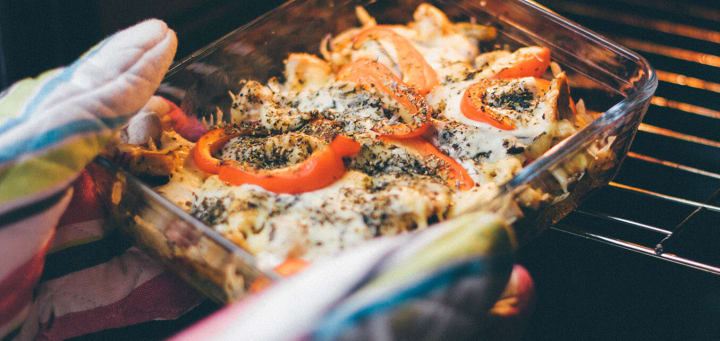Disgusting Things You Didn't Know About Reheating Food
Ate reheated pasta? Grab a barf bag. You're gonna hear some pretty disgusting things you didn't know about reheating food in this article.

There isn't a single person alive who hasn't eaten reheated food—and if you claim you've never had leftovers, you probably just don't remember things very well. Eating leftovers is the norm.
Leftovers are a regular thing in almost every household, especially if you have a small family or have multiple family members on strict diets. At restaurants, portions are so large that a "doggie bag" is just the way to go.
Though you should be alright with a lot of the goods you reheat, chances are that you've probably had one or two moments where reheated goods didn't fare too well. This might be due to some of the disgusting things you didn't know about reheating food—like the facts below.
The most common issue people have with reheated foods is food poisoning.

If you've ever eaten at Applebee's, congrats. You probably already know what I'm talking about. (Hey, I'm calling it like I'm seeing it. Applebee's is one of the worst restaurant chains in existence.)
One of the more disgusting things you didn't know about reheated food, we're willing to bet, is the sheer number of people who get sick from food poisoning as a result of it. Reheating doesn't always kill germs that cause food poisoning.
Because reheating won't always kill the bacteria that found itself on there while food was left out, around 48 million people will get food poisoning every year—in the United States, alone. What's scarier than that is that 3,000 Americans will die of food poisoning every year.
Yep. Applebee's can theoretically kill you.
The most dangerous food to reheat is rice.
Rice is a major food staple throughout most of the world. The problem with uncooked rice is that it contains a lot of spores of bacteria that can cause food poisoning. This rice can often survive the cooking process, but in fewer quantities that our bodies can typically fight off.
The problem stars when cooked rice is left out. During that time, bacteria multiplies, which often causes there to be too much to fight off. This food then gets reheated, eaten, and causes food poisoning.
It's even called "Fried Rice Syndrome" because it's such a common problem.
Reheating veggies can cause bad stuff to happen to your blood.

This is one of the less disgusting things you didn't know about reheating food, but still is worth noting. Vegetables have delicious goodness in them, as well as a nutrient group called nitrates. Bacteria in reheated vegetables that have nitrates can cause the nitrates to change their chemical makeup into nitrites.
This small change really isn't so small. Nitrites have been linked to higher rates of certain forms of cancer as well as a blood disorder called methemoglobinemia. Methemoglobinemia will allow your blood to carry oxygen, but won't let it use it effectively. It's potentially lethal.
This is why doctors advise parents against feeding their young children foods that are high in nitrates like hot dogs or chicken nuggets, by the way.
You're probably not even reheating the food as much as you are warming it up.
There are a lot of disgusting things you don't know about reheating food, including what happens when food reaches a certain level of warmth. Food safety specialists tell people to avoid keeping food temperatures anywhere between 40 degrees and 140 degrees Fahrenheit.
This range of temperatures is called the "Danger Zone" where most bacteria ends up multiplying at its fastest rate. If you're just mildly warming your food up, you are likely just making bacteria spread faster and putting yourself at a higher risk for infection.
Restaurants reheat food all the time too—and they rarely ever do it correctly either.

There are a lot of restaurants that reheat food, and this is true in both standard dining and fast food joints. When you reheat food, it's supposed to be hot to the point of steaming. This occurs around 160 degrees or so, at the point where heat will typically kill off most germs.
Most restaurants do not serve their food piping hot, which means that they aren't serving the reheated goods safely. Additionally, you don't know how long the food they're serving you has been sitting there.
This can be true, even about healthy fast food options. If that's not one of the most disgusting things you didn't know about reheating food, we don't know what is.
One of the most common bacterias associated with food poisoning is also found in feces.
If you're looking for some seriously disgusting things you didn't know about reheating food, let's talk about where some of the bacteria in your food that reheating is supposed to kill could have come from.
If you've ever gotten E.coli, congrats—that's often found in feces and in human urine. We'll let you figure out how that food poisoning could happen.
Reheating health food may be a self-defeating purpose.

If you're the type to eat healthy food and then reheat your leftovers the next day, you're in for a shock. A lot of the nutrients that you want to absorb end up getting destroyed with reheating—or really, heat in general.
People who reheat foods repeatedly are basically just eating calorific sludge. While this may not seem like one of the more disgusting things you didn't know about reheating food, realizing the how nutrient-deficit the food you spent so much money on is might change your mind.
If you ask us, that's a pretty disgusting waste of money and effort.
Potatoes aren't really good to reheat, at all.
Ever heard of Clostridium botulinum? It's also known as the bacteria that causes botulism, and it's heavily associated with potatoes. Reheating potatoes, particularly when it comes to the ones that you may have left in tinfoil, is one of the fastest ways to get botulism.
This bacteria causes paralysis and death if left untreated, and also is caused by improperly canned meats. The fact that it can get that rampant while reheating occurs makes the risk of botulism one of the more disgusting things you didn't know about reheating food—but should.
The cooking process still changes food long after it's stopped being on the stove, which is why reheated food always tastes funky.

Cooking causes chemical changes to your food. It causes proteins to unravel, enzymes to deteriorate, and other elements of your food to shift. Even the moisture in your food will change—regardless of how you keep the food stored.
These changes continue long after you take food off the stove and harm the composition of what you're eating. That's why reheated food tastes different. It's because you're eating a reheated version of a deteriorated dinner. If that isn't rank, we don't know what is.
Perhaps one of the most disgusting things you didn't know about reheating food is that your brain is also wired to like leftovers.
Ever wonder how chili or stew always tastes ten times better reheated? A lot of the breakdown that makes reheated food and leftovers change taste also can add a good amount of flavor. The aromatics in reheated food often become more powerful, which in turn makes a delicious smell.
Our sense of smell is linked to our sense of taste, which makes that food taste a bit better. Deteriorated protein is also way more tender, which is why reheated pulled pork has that great texture. If you're psychologically tied to a certain kind of leftover, that also can come into play.
This means that we're wired to love that bacteria-ridden stuff, even though we should try to avoid food poisoning like the plague. Gross.
About the Creator
Rowan Marley
Rowan Marley is a 20-year-old sports enthusiast who hails from Brooklyn. When he's not hitting up a local Zumba class, he's drinking organic smoothies. That's just how he rolls.






Comments
There are no comments for this story
Be the first to respond and start the conversation.